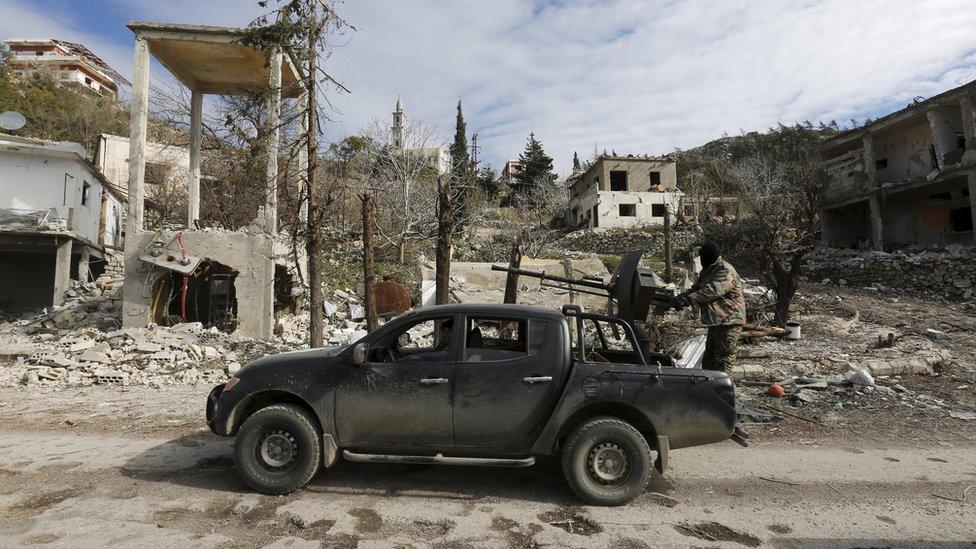Syria conflict: Key opposition group to join Geneva talks
- Published
The talks have already been delayed, amid arguments over who should attend
The main Syrian opposition group has said it will join peace talks that have opened in Geneva.
The Saudi-backed High Negotiations Committee (HNC) earlier said it would only join if Syrian government forces ended their air strikes and blockades.
UN envoy Staffan de Mistura has already met the Syrian government's delegation in the Swiss city.
More than 250,000 people have died and 11 million have fled their homes in almost five years of war in Syria.
The Syrian civil war has also been the biggest driver behind Europe's migration crisis.
On Saturday, at least 39 migrants, among them children, drowned in the Aegean Sea while trying to cross from Turkey to the Greek island of Lesbos.
International system has failed Syria
The so-called proximity talks are expected to last six months, with delegations sitting in separate rooms and UN officials shuttling between them.
Among those attending will be delegates from the government of Syrian President Bashar al-Assad and those opposed to his rule - but not jihadist militants from so-called Islamic State (IS).

Geneva peace talks
Who is attending? Delegates from the Syrian government and the main opposition bloc, the High Negotiations Committee (HNC). Other opposition figures have been invited as advisers.
Who is not attending? Syrian Kurdish group the PYD (regarded by Turkey as a terror group); so-called Islamic State (IS); al-Nusra Front.
What is being discussed? A possible ceasefire; release of prisoners; aid deliveries to the worst-hit areas; the threat from IS.

A delegation of 17 negotiators and 25 others from the opposition HNC is due to arrive in Geneva on Saturday evening, AFP news agency reports.
Farrah el-Atassi, an activist close to the HNC, told Reuters the team would talk to Mr de Mistura but would not negotiate directly with the Syrian government.
She told the BBC that the opposition would focus on humanitarian relief and the release of political prisoners.
Nick Bryant says more than half a million people need food and medical supplies
Separately, US Secretary of State John Kerry on Friday had a phone conversation with the HNC, urging the group to attend the talks.
State Department spokesman John Kirby later told reporters that Washington believed it was "important for these talks to continue without preconditions".
British Foreign Secretary Philip Hammond welcomed, external the "difficult decision" the HNC had made, and said he "expects both sides to participate in good faith to finally provide the peace the Syrian people deserve".
Mr de Mistura said he had a "good reason to believe" that the HNC would join the talks on Sunday.
In a video message, external to the Syrian people on Thursday, Mr de Mistura said the talks "cannot fail".
"He will continue meetings with other participants in the talks and with representatives of the civil society subsequently," his office said.


The last talks aimed at ending the Syrian conflict broke down in 2014 after only two rounds
Earlier, the HNC said it was seeking an end to the bombing of civilians and assurances that aid would reach civilians in besieged towns, before attending in Geneva.
Later reports spoke of it "receiving assurances".
The immediate priorities of the talks are:
a broad ceasefire
humanitarian aid deliveries
halting the threat posed by IS
But the ultimate aim is a peace settlement that includes a transitional period ending with elections, in line with a UN Security Council resolution approved last month.
The last talks aimed at ending the conflict broke down in February 2014 after only two rounds. The UN blamed the government for refusing to discuss an opposition demand for Mr Assad to step down.
Despite little sign of a change in that stance, the rise of the IS group prompted the US and Russia to step up their efforts to get the warring parties back to the negotiating table.
In a separate development, the Dutch government announced it was planning to extend air strikes against IS militants to Syria. The Dutch are already bombing IS targets in neighbouring Iraq.